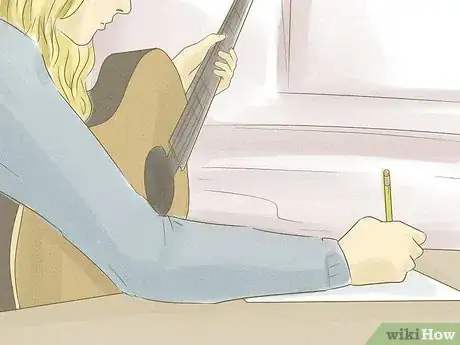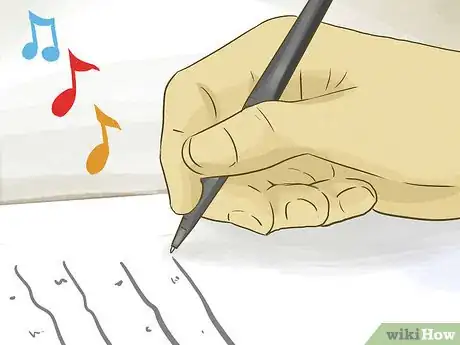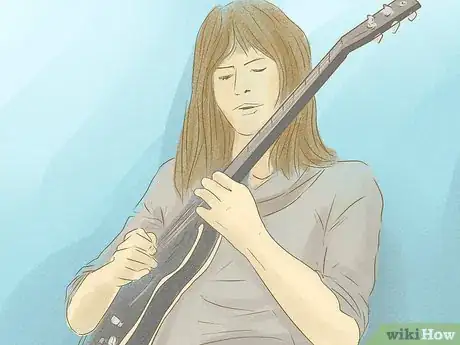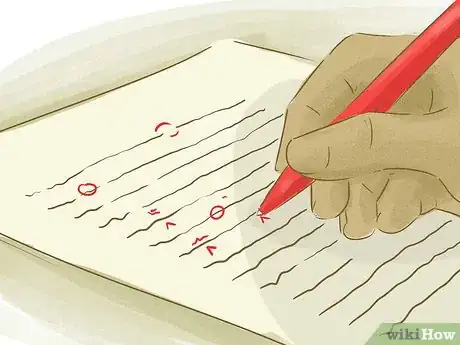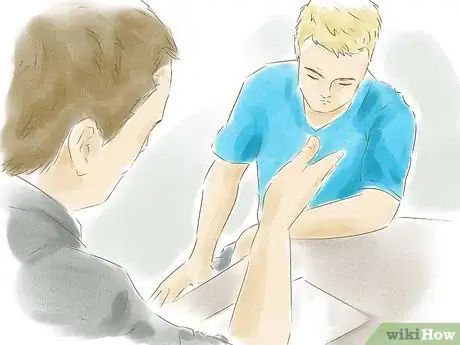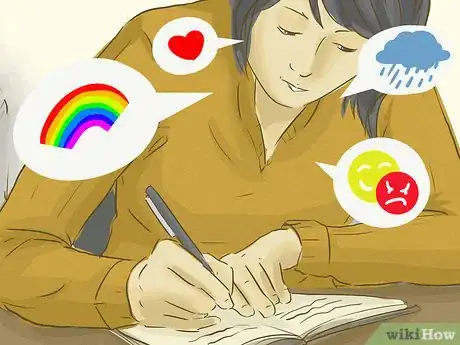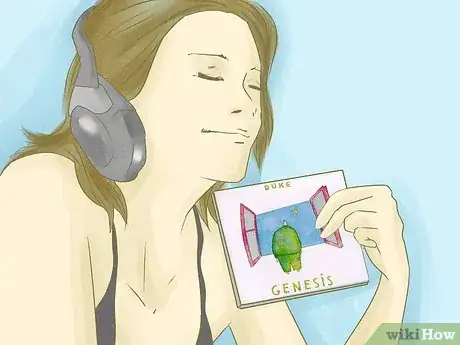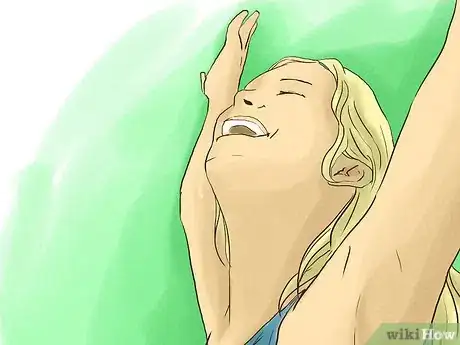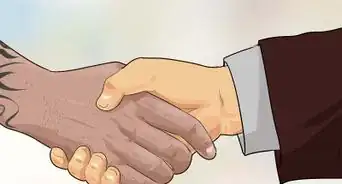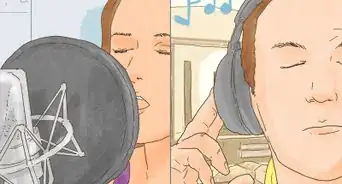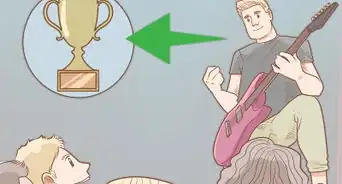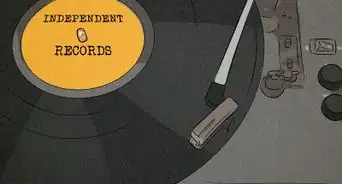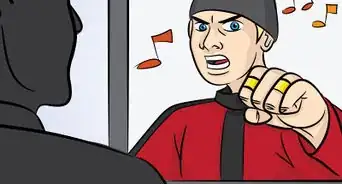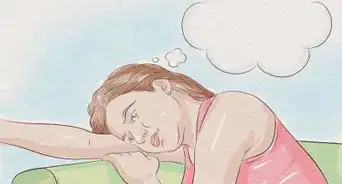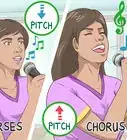This article was co-authored by Tanisha Hall. Tanisha Hall is a Vocal Coach and the Founder and Executive Director of White Hall Arts Academy, Inc. an organization based in Los Angeles, California that offers a multi-level curriculum focused on fundamental skills, technique, composition, theory, artistry, and performance at a conservatory level. Ms. Hall's current and previous students include Galimatias, Sanai Victoria, Ant Clemons, and Paloma Ford. She earned a BA in Music from the Berklee College of Music in 1998 and was a recipient of the Music Business Management Achievement Award.
There are 12 references cited in this article, which can be found at the bottom of the page.
wikiHow marks an article as reader-approved once it receives enough positive feedback. This article received 15 testimonials and 92% of readers who voted found it helpful, earning it our reader-approved status.
This article has been viewed 133,999 times.
Have you always wanted to write that one beautiful song that never seems to come to you? Being a good songwriter is all about practice. You need to be humble enough to learn from the greats but confident enough in yourself to share your thoughts and melodies with the world. Being a good songwriter like being any other musician, requires practice, experimentation, and some study.
Steps
Writing a Song
-
1Relax and start writing whatever rhymes, phrases, or ideas come to mind. Don't lose the faith that brought you to this article just because a brilliant song isn't bursting out of you. The only way to have creative thoughts is to do creative work. So grab a pen and paper and start scribbling. Spend your first 5-10 minutes writing just warming up your brain and relaxing into "songwriting" mode.
- Freewrite for 5 minutes. Put the pen to paper and put on a timer, and don't ever stop writing until the timer is done. It doesn't matter what you say, just that you're saying something at all. When you're done, read over it and see if any lines or ideas stick out for a song.
- Improvise on your instrument, humming melodies or even blurting out lines, rhymes, and ideas. If one catches your fancy, follow it and see if it leads to a song.
- Review your old idea notebook and expand on one idea you like. If you have a collection of ideas, lines, and melodies somewhere, pull it up and review it for a few minutes. If you find an idea you like, spend a few minutes writing down every thought you can relate to that idea.
-
2Write songs in whatever order they come to you. Some days you'll come up with a great verse, but have no chorus to back it up. Some days you'll write a killer instrumental line but have no idea what lyrics it needs. Most people think that you have to have a specified topic about something in order to write a really good song, but in reality all you need to do is write. Keep working on ideas and you'll notice that they start to develop and join together naturally.
- Tack up different song titles or ideas on your wall. Each time you come up with a line or new part of the song, post it underneath the title, moving it around when necessary.[1]
Advertisement -
3Consider song structure as you develop lyrics and melodies. Song structure is simply the order in which you place your parts, and is most commonly something like: Intro → Verse → Chorus → Verse → Chorus → Breakdown/Change Up → Chorus → Outro.[2] However, there are a million ways to adjust this structure to fit your song and style, including:
- Many songs feature a "bridge," which is a short, new set of lyrics or melody between the chorus and melody.
- Songs off Bob Dylan's seminal album Blood on the Tracks" and Lupe Fiasco's song "Murals" both feature verses with no chorus or bridge, highlighting the wide-ranging ideas and songwriting talents of the artists. You don't need to follow any form if you don't want to.
- If you're an instrumentalist, where would you fit a solo, instrumental break, or change of melody? How, as a listener, are you pulled from section to section?[3]
-
4Grab an instrument and start playing underneath your words. Now that you have all of your words brainstormed you can mix and match different sentence fragments to get some lyrics. With an instrument in hand, start experimenting with different melodies that sound good to you. Hum or whistle along while playing to make up the melodies for your lyrics, experimenting until you find something you like.[4]
- It is rare that the entire, finished idea will come to you at once. So keep improvising until you find something that clicks.
-
5Re-write once you feel confident in the developing ideas. If something doesn't make sense, write it again and try to accompany it with other rhyming words and sentences. While rewriting, work on cutting away ideas that don't work and finding the theme of the song. Now that you have some parts, what is the song "about?" Even if the answer is "nothing," you want to use your rewrite to hone in on this idea and make the song as impactful as possible.
- After re-writing you want a nearly finished song structure. It will change as the song develops, but you want to get to a point where you could play the entire song at once and see how it sounds.[5]
-
6Get feedback and advice on the song. Play the song for a friend, share it on the internet, and start getting feedback. Do people tap their feet? Do they hum along? Do they come up with the same theme for the song that you do? Music is meant to be shared with others, and you'll notice that your song will subtly evolve as you keep playing it. This is natural, and it is often after a few performances that you can finally perfect the song and move on to another one.
- James Brown developed the genre of funk at live shows when he noticed what songs, parts, and instruments people were dancing the most to.[6]
-
7Try a few simple tricks to adjust your songs if you get stuck in a rut. All writers, no matter what they are writing, get stuck from time to time. The best advice if you get stuck is to keep writing. Inspiration is not something that is turned on and off randomly -- you need to sit down and write in order to write great songs. Try the following tips and tricks to keep you writing, even when it feels like nothing is working:
- Reverse the chords. If you love the verse melody but have no chorus, reverse the chords. What happens if you reverse half of them, or swap two out?
- Say it differently from your favorite song. Rappers like Jay-Z used to re-write their favorite songs, keeping the same structure but changing the words inside and rhymes, as a songwriting exercise.[7]
- Create contradictions. If you've got a slow, long chord melody, try using short, staccato phrase when you sing. If you've got a peppy, high-tempo song, try bringing down the energy in the bridge or breakdown.[8]
- Write with a partner. The most successful songwriting duo in history, Lennon/McCartney, had to be on to something.[9]
- Drop your judgment and break some rules. The best artists know the rules so that they can break them. There is no "wrong" way to break a song, so listen to your own imagination and write what sounds good to you.[10]
Growing as a Songwriter
-
1Learn to sing and play your favorite songs. The best singers in the world spent years learning the songs of other songwriters, studying the art form and playing music daily. The Beatles spent 2 years in Germany as a cover band, sometimes playing for 8-10 hours each night.[11] Bob Dylan covered folk songs, even lifting old-time melodies, for years before he started recording only original music. Both Bob and the Beatles are considered some of the greatest songwriters to ever live -- and they both started as cover bands. This isn't a mistake, this is because they needed to learn from the greats before becoming greats themselves.[12]
-
2Write down fragments of songs whenever they come to you. Don't feel like you need to have a full song in your head in order to write it down. Even if all you think of is a single rhyme, or you just imagine a wordless melody to hum, record it for later. These kernels of music may fit perfectly into songs you haven't finished yet, or become the seeds of completely new songs over time. Great songwriters are writing constantly.
- Dedicate a notebook to music. Whenever you're out of inspiration, turn back to it and read a few pages -- what ideas stick out again?
- Famous singer-songwriter Tom Waits carries a tape recorder with him everywhere he goes, recording lines, melodies, and inspiration throughout the day and listening to it at the end of the week.[13]
-
3Let influences hit you from anywhere. There is no experience that can't be turned into a song as long as you keep your mind open to it. From surrealistic trips into pop-culture tragedy in "American Pie," to the endless professions of love and loss in pop music, to an ode about a "Yellow Submarine," great songwriters can spin a song out of their life, imagination, the news, or simply a feeling. This isn't to say that your should write about anything and everything, simply that there is no "wrong" topic for a song.
- Don't purge your ideas because you "don't think they'd make a good song." Just let your ideas flow without judgment -- you can decide if an idea isn't worth it when you're recording your album or writing a set list.
- No idea is too small to become a song. "99 Red Balloons" is about a Rolling Stones concert effect where they released balloons, for example.[14]
- "I think songwriting is the ultimate form of being able to make anything that happens in your life productive." --Taylor Swift[15]
-
4Steal from your favorite artists, bands, and songs. "Good artists borrow, great artists steal." Interestingly enough, this quote was originally attributed to Picasso but is also found in the writing of T.S. Elliot, Steve Jobs, and many others, all of whom may have stolen it. The point is simple -- you need to consciously pull your influences and inspirations into your writing.[16] If you're struggling with a melody for your new song, play the chords from a similar song. Snap up your favorite lines from songs and re-use them in interesting ways, and realize that this isn't really "stealing," it is just the artistic process. All art is a combination of your own feelings and the notes, chords, and melodies that are already written -- so own up to this and start stealing like a pro.
- Note how Vampire Weekend's "Step" re-purposes several melody lines from Souls of Mischief's "Step to My Girl."
- Bob Dylan's famous, game-changing lyrics to "Blowin' in the Wind" is set to the old melody of "No More Auction Block."
- Hip-hop is built on sampling, homages, and borrowed clips. Sometimes it's obvious ("50 [Cent] told me go 'head mix the style up"], sometimes it's subtle ("there she goes again / the dopest Ethiopian").
-
5Play an instrument regularly. There is a reason that many of the best songwriters can play 5-10 different instruments, even if only a little bit. Playing a song without thinking of words sharpens your ear for melody, rhythm, and song structure. It also helps you think about music without the pressure of coming up with original words. Even if the instrument isn't one that you normally play, spend some time getting to know music in all of its forms -- it will improve your songwriting considerably.
- You don't have to play multiple instruments to be a songwriter, just something musical. Start playing an easy melody instrument like a piano or guitar to learn the guts of your music as you write
-
6Enjoy your life outside of songwriting. It may seem like odd advice to stop songwriting in order to be a better songwriter, but you need to live your life to the fullest to give yourself fuel for a great song. The best way to do this is to set aside time for songwriting every single day, giving yourself a few dedicated hours to focus on your craft. As you get used to this schedule, you'll find it helps you turn on "songwriting mode" when you need to write, and you won't feel worried about not-writing when you're at a party, on a hike, or reading a book.
- “Life isn't a support-system for art. It's the other way around.” -- Stephen King[17]
Expert Q&A
-
QuestionWhat does it take to be a good songwriter?
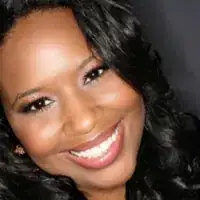 Tanisha HallTanisha Hall is a Vocal Coach and the Founder and Executive Director of White Hall Arts Academy, Inc. an organization based in Los Angeles, California that offers a multi-level curriculum focused on fundamental skills, technique, composition, theory, artistry, and performance at a conservatory level. Ms. Hall's current and previous students include Galimatias, Sanai Victoria, Ant Clemons, and Paloma Ford. She earned a BA in Music from the Berklee College of Music in 1998 and was a recipient of the Music Business Management Achievement Award.
Tanisha HallTanisha Hall is a Vocal Coach and the Founder and Executive Director of White Hall Arts Academy, Inc. an organization based in Los Angeles, California that offers a multi-level curriculum focused on fundamental skills, technique, composition, theory, artistry, and performance at a conservatory level. Ms. Hall's current and previous students include Galimatias, Sanai Victoria, Ant Clemons, and Paloma Ford. She earned a BA in Music from the Berklee College of Music in 1998 and was a recipient of the Music Business Management Achievement Award.
Vocal Coach It's important to put your ideas down on paper whenever they strike you. Also, just listen to as much music as you can in the genre that you're writing songs. For example, if you want to be a great folk songwriter, listen to a ton of folk music! It also helps to step back on occasion and really remind yourself why you're pursuing this goal.
It's important to put your ideas down on paper whenever they strike you. Also, just listen to as much music as you can in the genre that you're writing songs. For example, if you want to be a great folk songwriter, listen to a ton of folk music! It also helps to step back on occasion and really remind yourself why you're pursuing this goal. -
QuestionIs it a must to always use complex, nicer literary words in lyrics?
 Community AnswerIn songwriting, there are no rules; it's just what sounds the best. If the right word is simple, don't try to make it more complex.
Community AnswerIn songwriting, there are no rules; it's just what sounds the best. If the right word is simple, don't try to make it more complex. -
QuestionHow can I become a lyricist?
 Community AnswerWrite down lyrics as they pop into your head, looking to your surroundings and personal life for inspiration. Listen to great lyricists to learn from their styles, then practice putting your lyrics together into a story that can be sung.
Community AnswerWrite down lyrics as they pop into your head, looking to your surroundings and personal life for inspiration. Listen to great lyricists to learn from their styles, then practice putting your lyrics together into a story that can be sung.
Warnings
- "Great artists steal" is a way to express the use of other ideas, structures, and melodies. It is not an excuse to claim an entire song as your own, as this is not only illegal, it will not make you a good songwriter.⧼thumbs_response⧽
References
- ↑ http://www.soundonsound.com/sos/jan99/articles/20tips.458.htm
- ↑ http://www.musicradar.com/tuition/tech/how-to-write-a-hit-structure-542126
- ↑ http://www.musicradar.com/tuition/tech/how-to-write-a-hit-structure-542126
- ↑ Tanisha Hall. Vocal Coach. Expert Interview. 27 March 2020.
- ↑ http://hillsong.com/collected/blog/2014/09/10-ways-to-become-a-better-songwriter/#.Vh_oxis4nEYM
- ↑ http://www.soundonsound.com/sos/jan99/articles/20tips.458.htm
- ↑ http://www.soundonsound.com/sos/jan99/articles/20tips.458.htm
- ↑ http://www.theatlantic.com/entertainment/archive/2012/07/25-great-songwriters-on-the-art-of-songwriting/259594/#slide11
- ↑ http://hillsong.com/collected/blog/2014/09/10-ways-to-become-a-better-songwriter/#.Vh_oxis4nEY
- ↑ http://www.musicthinktank.com/blog/top-10-rules-for-better-songwriting.html
- ↑ http://www.telegraph.co.uk/travel/artsandculture/7949677/The-Beatles-in-Hamburg-50-years-on-from-the-bands-first-concert.html
- ↑ http://www.soundonsound.com/sos/jan99/articles/20tips.458.htm
- ↑ http://pitchfork.com/features/interviews/6492-tom-waits/
- ↑ http://www.songfacts.com/detail.php?id=2511
- ↑ http://www.brainyquote.com/quotes/quotes/t/taylorswif579487.html#R3wvsCgjmCTjqegI.99
- ↑ Tanisha Hall. Vocal Coach. Expert Interview. 27 March 2020.
- ↑ http://www.screenjunkies.com/movies/actors-directors/5-stephen-king-quotes-every-writer-should-heed/
About This Article
To be a good songwriter, get started by freewriting to let your creativity take over. Set a timer for 5 minutes and just write whatever comes to your mind. After you’re done warming up, see if any ideas leap out at you that are worth developing into your song. Take one of these ideas and turn it into lyrics that make sense to you. As you write, don’t get caught up in trying to follow an exact structure because it’s more important to get your lyrics down first, then you can play with the order and style later. For example, if the chorus comes to you before the intro, verses or ending of the song, just go with the flow and write it first, letting the rest of the song come to you as it feels right. For more tips, including how to find inspiration for your songs, scroll down!
